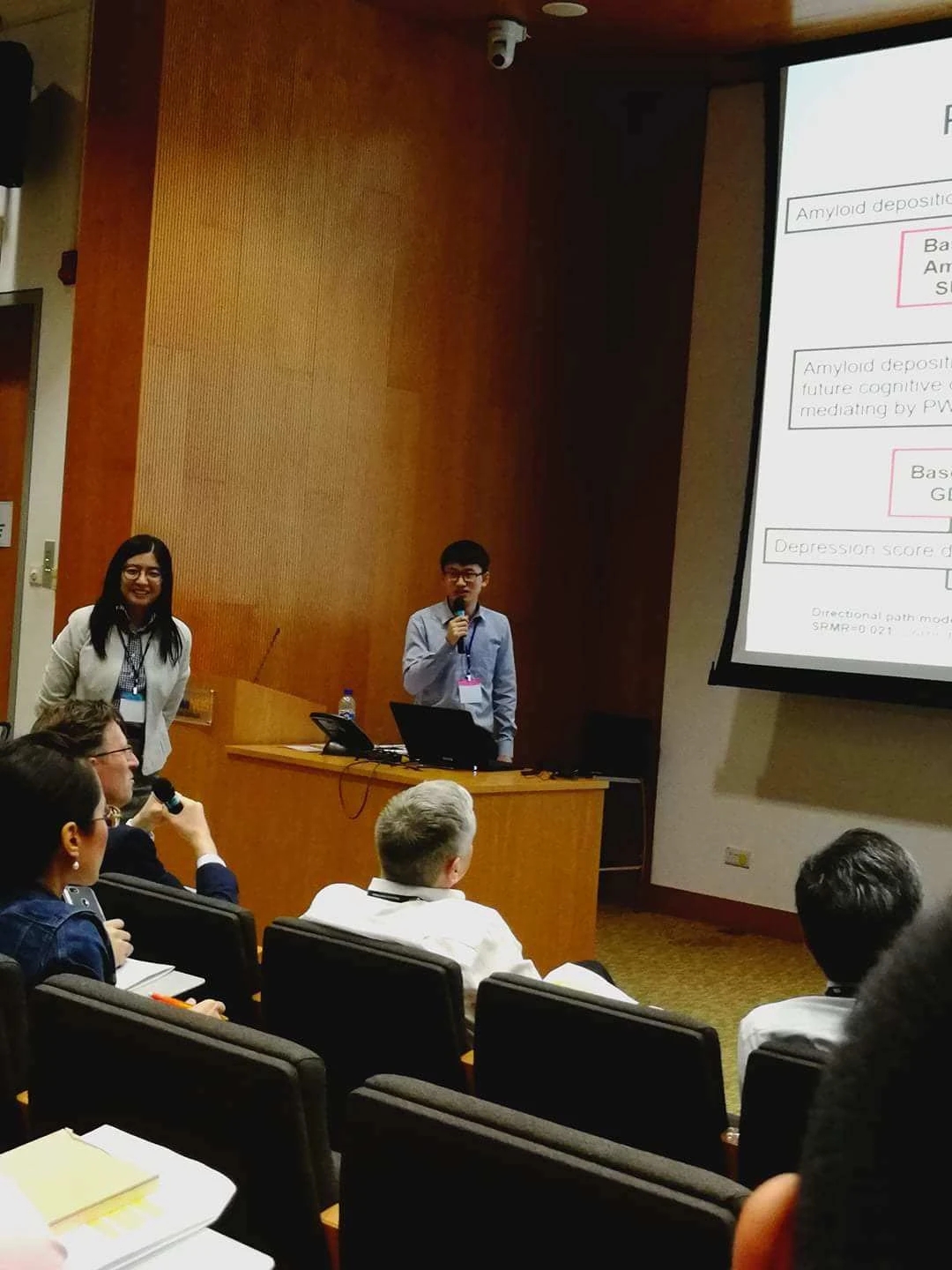Young Chinese radiologist: 'I care about your memory'

Luo Xiao (center) speaks at a neurocognitive symposium at the Yong Loo Lin School of Medicine at the National University of Singapore (NUS), March 15, 2018. He was supervised by Helen Juan Zhou (L), an associate professor at NUS. / Luo Xiao
As people in China once again feast on moon cakes and gather under the full moon, Luo Xiao, a radiologist at the Second Affiliated Hospital of Zhejiang University's School of Medicine, cautions China's elderly population to go easy on the calorie-rich moon cakes in his latest short video.
For over a year, Luo, a doctor from east China, has been making and posting videos on Alzheimer's disease, a degenerative brain disease that can lead to dementia, as part of his effort to prevent the neurological disorder from affecting more Chinese seniors.
Recently, a video of the young doctor leading senior citizens in a merry dance went viral on Chinese social media. It's a dance he especially choreographed to help seniors who are at high risk of getting dementia.
Dancing in public is enjoyed by the graying population across Chinese cities. So, Luo chose dance as his medium to draw attention to Alzheimer's.
The dance video won instant attention on social media. Within days, the number of Luo's followers had risen from 10,000 to 220,000 on Xigua Video, a Chinese online video-sharing and livestreaming platform owned by ByteDance.
On social media, he is known as Luo Xixi Boshi, Doctor Luo Xixi, and has accumulated one million subscribers across many platforms. About 80 percent of them are over 50.
Luo has been producing videos on Alzheimer's since early 2020. Below his videos, he answers most of the comments with detailed instructions on where and how to seek medical help to treat Alzheimer's.
"I must answer their questions. They are much older than me, and most of them are not familiar with interaction through social media, which you can tell from their typos. Responding to them is to show respect and care," Luo told CGTN.
A boy's dream and a new project
Born in 1990 in the eastern coastal city of Wenzhou, Luo was brought up by his grandmother, as his parents were busy working. Most of the time, she was in poor health. Whenever she was feeling unwell, Luo's uncle, a doctor, would treat her. Admiring his uncle's skills in healing people, the boy aspired to become a doctor.
Luo began to study brain science in 2013 when he entered Zhejiang University to pursue a master's degree. He majored in medical imaging, and his supervisor suggested that he study diagnosing Alzheimer's using imaging technology. Then the top student in his class, Luo became the founder of a research team on Alzheimer's.
Leading the long-term research project funded by the National Natural Science Fund, Luo has studied about 600 patients and published more than 20 research papers in SCI journals over the past eight years. However, he realized that his findings were meaningless if they couldn't find their way from paper to practice.
Early symptoms of Alzheimer's are usually hard to detect. Hence, most patients easily ignore them, resulting in many people missing the critical early detection and intervention window.
"It's painful to see the disease destroy a decent man's life," said Luo, referring to one of his patients.
The man he is referring to is a retired math professor at Zhejiang University. When his symptoms started to become more pronounced, the professor stole things from the street, picked up trash and lost his temper easily. His wife told Luo that he even went out to a shopping mall in nothing but underwear.
The professor late became depressed and thought about taking his own life. Six years later, in 2020, he lost the ability to walk and talk and died soon after.
"People should fear Alzheimer's," said Luo. "During the last six or seven years of their lives, patients lose their memory, forget how to swallow, cough and defecate, which soon leads to infection and then death."
He said the disease can take a toll on one's family and society as a whole.
"At least one family member needs to provide full-time care for a patient," he explained, adding that cumulatively, "The growing number of patients can take a toll on our economy and society."
That is why he wants to raise the public's awareness about the disease and the importance of early detection.

